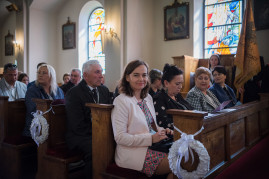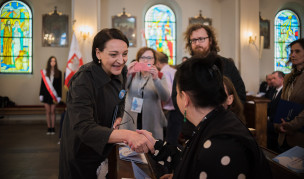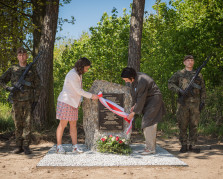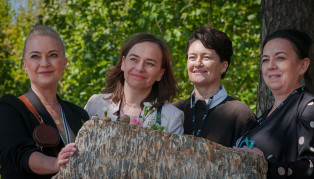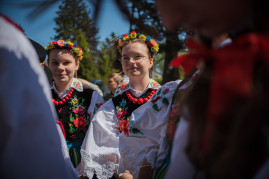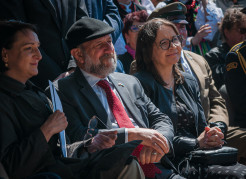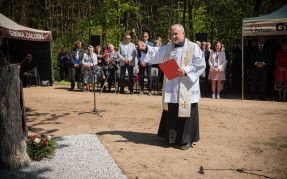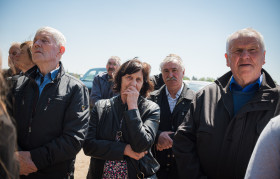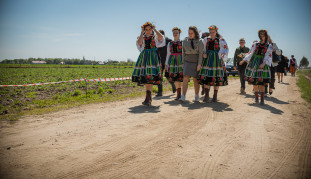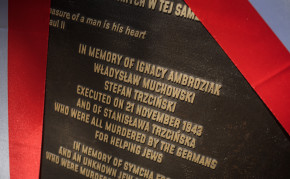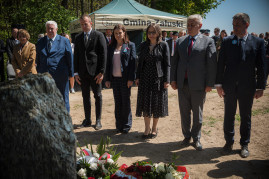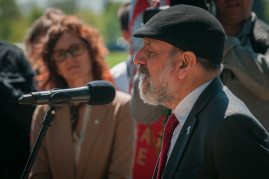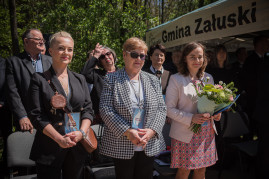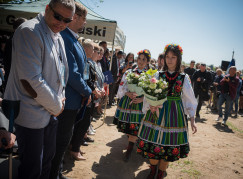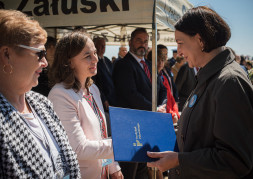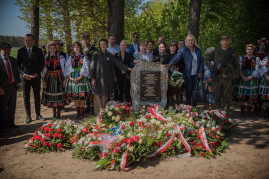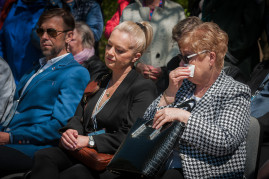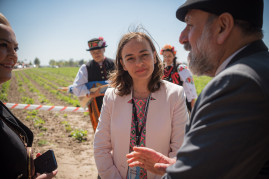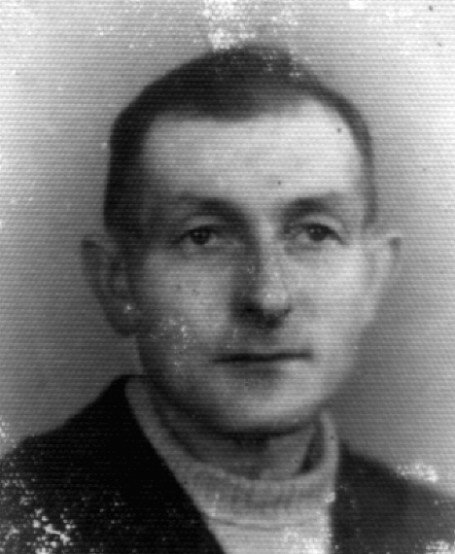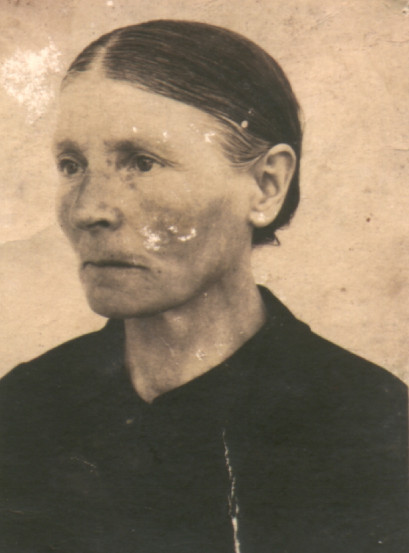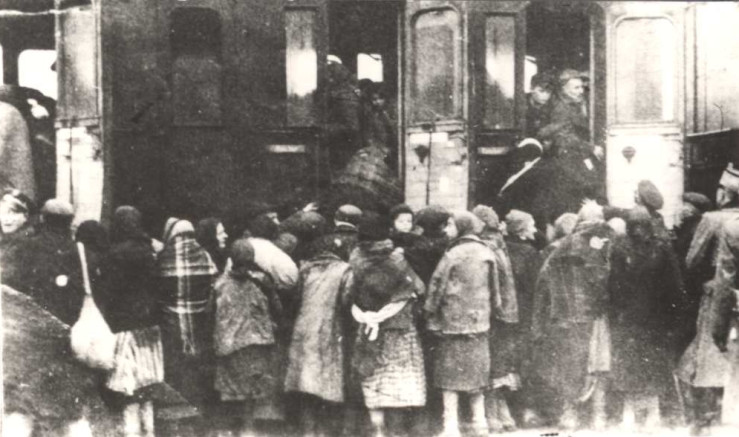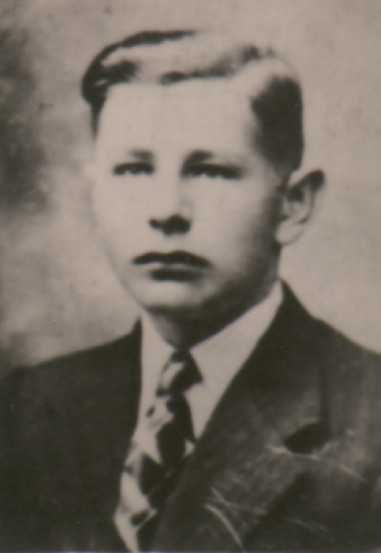The commemoration of Ignacy Ambroziak, Stefan Trzciński and Stanisława Trzcińska, as well as Władysław Muchowski, who were murdered for helping Jews during the German occupation - Instytut Pileckiego
The commemoration of Ignacy Ambroziak, Stefan Trzciński and Stanisława Trzcińska, as well as Władysław Muchowski, who were murdered for helping Jews during the German occupation
On 10 May 2023 in Złotopolice, we commemorated Ignacy Ambroziak, Stefan Trzciński and Stanisława Trzcińska, as well as Władysław Muchowski, who were murdered for helping Jews during the German occupation.
Commemoration
On Wednesday in the Złotopolice Forest, we “called by name” Stefan Trzciński, Ignacy Ambroziak and Władysław Muchowski, who were hanged by the Germans on 21 November 1943 for helping Jews. We also commemorated Symcha Frost and three unknown men – a Jew and two Poles – who were hanged with him, as well as Stanisława Trzcińska, Stefan’s mother, who was murdered a few weeks later.
The guests included Prof. Magdalena Gawin, Director of the Pilecki Institute, Michael Schudrich, the Chief Rabbi of Poland, as well as representatives of the local government: Elżbieta Wiśniewska, Starost of Płońsk; Kamil Koprowski, Head of the Załuski Commune; Beata Pierścińska, Head of the Naruszewo Commune; Aleksander Jarosławski, Head of the Płońsk Commune; as well as the clergy, the military, schoolchildren and families of the “Called by Name”.
The ceremony began with a mass at the Church of Divine Providence in Kamienica.
Next the commemorative plaque was unveiled in the Złotopolice Forest.
The 31st commemorative stone in Złotopolice is another token of remembrance about those who risked their lives to rescue other people. The Pilecki Institute has “called by name” 76 people, including the victims from the Złotopolice Forest.
President Andrzej Duda wrote a letter to the participants of the ceremony. The letter was read out by Prof. Magdalena Gawin, Director of the Pilecki Institute.
President Duda reminded that we have been celebrating the National Day of Remembrance of Poles who Saved Jews under German Occupation for five years now.
This is our collective homage to our compatriots who in the darkest times, guided by Christian love of neighbor and solidarity with the persecuted, with heroic courage and self-sacrifice provided help to their Jewish fellow citizens and neighbors who were designated for extermination, wrote the President.
We celebrate this national day on 24 March, because on this day in 1944 the German criminals murdered the Ulma family: Józef Ulma, his pregnant wife Wiktoria and their six underage children, as well as eight Jews whom they were hiding. This year, following Pope Francis’ decision, we will witness a momentous event – the beatification of the Ulma Family. Among our compatriots, however, there were many more such martyrs who were murdered in retaliation for the most simple gestures of humanity. It is to them that the “Called by Name” project – which is being developed with such commitment by the Witold Pilecki Institute of Solidarity and Valor – is devoted, he wrote.
The president also pointed out that in German-occupied Poland, helping Jews was punished with death, and yet numerous Poles did not hesitate to rush to the rescue of their Jewish compatriots – friends, neighbors, but also complete strangers.
He wrote that “we have an important obligation to fulfill”.
Today, in independent Poland, they are our national heroes – on a par with soldiers who fought for the freedom of our homeland gun in hand. It is our duty to carefully foster the memory about those who sacrificed their lives to help their Jewish neighbors and fellow citizens of the Second Polish Republic. It is our duty to carry out in-depth historical research and promote knowledge about this both tragic and laudable chapter of our history, emphasized the President.
Joanna Trzcińska, great-granddaughter of Stanisława Trzcińska and relative of Stefan Trzciński, spoke on behalf of the “Called by Name” families.
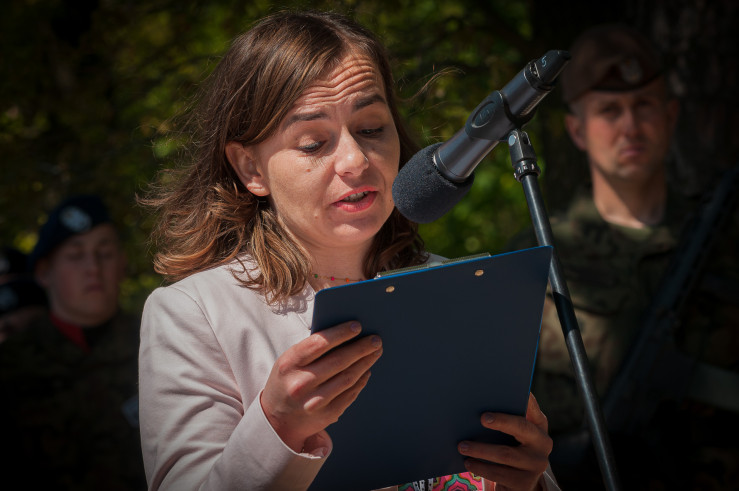
This place reminds us that less than 80 years ago, the world of Ignacy Ambroziak, Władysław Muchowski, Stanisława and Stefan Trzciński and many other people came to a brutal end. The world in which sharing your meal, providing shelter, as well as everyday human kindness and willingness to help were punished with imprisonment, persecution and death. They remained human in these inhumane times, trying to save someone else’s life, someone else’s small world. We are very proud that among those silent heroes were our beloved fathers, grandfathers and neighbors. The foundations and pillars of our present small world, said the visibly moved Trzcińska.
They were seemingly ordinary people, who – despite fear and concern for their own lives – provided help to others without calculation, without seeking gain or acclaim, and at the same time showing their courage and humanity. May this stone become a token of our remembrance and gratitude. May it remind us that there is good in every person, that no grand deeds are needed to become a true hero. It is enough to be decent and to behave humanely in all circumstances of life, she emphasized.
The Director of the Pilecki Institute said that she would like the place of commemoration to remain “alive”.
I would like us to remember that the Ulma family died on 24 March, I would like children from the local school to learn about this story. These are silent heroes, local heroes. Just as Mr. President wrote – they are on a par with soldiers who fought gun in hand.
Referring to the sermon delivered on that day, Prof. Gawin reminded that “it is the duty of a Christian to make peace”.
All those whom we honor today wanted to make peace. They didn’t have the power to make peace in occupied Poland or in the world, but they wanted to make peace in their homes and hearts. We should always remember about it, she said.
She pointed out that death for helping others didn’t end with the German occupation.
Today there is a war in Ukraine. The Russians are shelling humanitarian convoys and shooting local activists who strive to help others. If we don’t name this crime, death for helping others will keep recurring in all armed conflicts, and the perpetrators will remain unpunished. As Christians, we are obliged to forgive, but this doesn’t mean amnesia, emphasized Prof. Gawin.
A letter to the participants was also written among others by Ambassador of Israel to the Republic of Poland Mr. Yacov Livne. He observed that we know only several names of the murdered: Ignacy Ambroziak, Władysław Muchowski, Stefan Trzciński and Stanisława Trzcińska. I hope that although 80 years have passed since these tragic events, it will be possible to determine the names of the remaining three people who lost their lives only because they were Jews and because they had the courage to stand up against evil, he emphasized. He also thanked everybody for their efforts to organize the commemoration.
Representatives of the local government also spoke to the gathered guests. Head of the Załuski Commune observed that “today is a very important day for the local community”. “With this symbolic monument, we are honoring the heroism and incredible courage of our ancestors, our brothers, who fell victim to Nazi cruelty,” he said.
He emphasized that it is the particular duty of the local government to take care of such memorials. “As head of the Załuski Commune, I will do everything in my power to ensure that this memorial to the victims from November 1943 has a special place in the local community,” he declared.
During the ceremony, letters from Adam Struzik, Marshal of the Mazowieckie Voivodeship, and Tobiasz Bocheński, Voivod of the Mazowieckie Voivodeship, were also read out. Wreaths and flowers were laid at the commemorative plaque. A prayer was also said.
The commemoration in Złotopolice was organized in cooperation with the local government – the Płońsk County, the Załuski Commune, the Naruszewo Commune and the Płońsk Commune. Partners of the event included the Płońsk Forest Inspectorate, the City of Płońsk and the Municipal Culture Center in Płońsk. The program received the Honorary Patronage of the President of the Republic of Poland Andrzej Duda.
A prayer for the dead was said by the Chief Rabbi of Poland Michael Schudrich.
(Polish Press Agency)
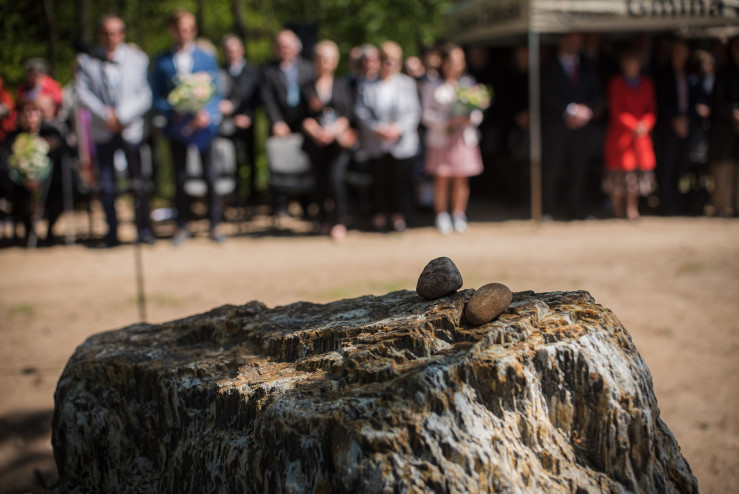
The Story of the Show Execution in the Złotopolice Forest
In the autumn of 1939, Northern Mazovia was incorporated directly into the Third Reich as Regierungsbezirk Zichenau, which formed part of Gau East Prussia. The Regierungsbezirk covered several counties, including the Płońsk county. In September 1940, a ghetto was established in Płońsk, and the Germans resettled 12,000 Jews there. Following the liquidation of the ghetto in December 1942, almost all residents were deported to the death camp of Auschwitz-Birkenau. Those who managed to avoid execution or deportation began a dramatic struggle for survival. Among Poles who went to the aid of Jewish escapees were Stanisława Trzcińska and her adult sons from Skwary in the Naruszewo commune, Ignacy Ambroziak, who lived with his wife Rozalia and son Henryk in Cholewy, and Władysław Muchowski, who ran a farm in Michałowo together with his family.
The Trzcińskis offered assistance to the Klin family, whom they had known before the war. They provided them with food and temporary shelter in the barn. On 23 August 1943, Stanisława’s homestead was surrounded by a German gendarmerie unit. One of the Germans had a piece of paper with the surnames of people who were helping Jews. The Germans commenced brutal interrogations. Stanisława was hit in the face several times, while Stefan was kicked and beaten unconscious by the gendarmes. Jan managed to escape and survive the war. Stanisława and Stefan were taken to a penal and investigative prison in Pomiechówek.
In the winter of 1942/43, the Ambroziak family provided assistance among others to two young Jews, who gave their names as Ignac and Julek. In October 1943, gendarmerie and Gestapo arrived at the Ambroziaks’ house. The Germans were looking for Jews. Although they didn’t find anyone, they beat up the family and transported Ignacy to Pomiechówek.
The Germans were looking for Jewish fugitives also at Władysław Muchowski’s house. The gendarmes from Naruszewo conducted a search of premises, brutally beating up Władysław and his son, Henryk, to force confession. Although the Germans didn’t find any Jews, they took Władysław and Henryk to the station in Naruszewo, from where Henryk was released and Władysław sent to Pomiechówek.
Towards the end of October 1943, the Germans held a briefing for village administrators from the communes where the arrested men had lived. They ordered that representatives of the villages in question must come to the edge of the forest between Złotopolice and Kamienica-Wygoda on 21 November for an execution of Poles who had been hiding Jews. On that day, the Gestapo men and gendarmes brought seven convicts from Pomiechówek, i.e. Stefan Trzciński, Ignacy Ambroziak, Władysław Muchowski, Symcha Frost, a Jew unknown by name and two other Poles (their surnames remain unknown, but they could have been Stefan Dubracki and Jan Wójcik). The Jews were hanged for alleged robberies and arms possession, while the Poles for hiding Jews and providing them with assistance. After a while the Germans ordered the village administrators to remove the bodies of the murdered and take them to the cemetery in Smoszewo. After the war, an exhumation of the murdered men was organized. Ignacy Ambroziak and Władysław Muchowski were buried in Radzymin. Stefan Trzciński was interred at the cemetery in Naruszewo.
The circumstances of death of Stanisława Trzcińska remain unknown. She was to be sent from the Pomiechówek prison to a concentration camp, bur during transport she was taken by the Germans at the Modlin station. She was probably murdered there towards the end of 1943 or at the beginning of 1944. Her body has not been found.
In 1991, the Yad Vashem Institute awarded the Righteous Among the Nations titles to Ignacy Ambroziak and his wife Rozalia, to Stanisława Trzcińska and her sons, Stefan and Jan, as well as to Władysław Muchowski.
Testimony of witness Jan Trzciński, 23 May 1985
I wanted to find out what happened to my brother and mother, and I learned that first they were taken to the gendarmerie post in Naruszewo, and from there to the penal and investigative prison in Pomiechówek. Towards the end of October 1943, the Gestapo men held a briefing for all village administrators from the Naruszewo commune and ordered them to gather people from their villages at the edge of the forest in Złotopolice on 21 November 1943 to witness what the Germans do to those who are hiding Jews. I didn’t go there, because I was in hiding, but I learned why the Germans actually wanted the village administrators to be there at that time. It turned out that the gendarmes from Naruszewo and the Gestapo men from Płońsk, Nowy Dwór and Płock hanged 7 men in Złotopolice; among them was my brother Stefan Trzciński, farmers Ambroziak and Muchowski from Cholewy, two Poles from Warsaw or its vicinity and two Jews. The bodies of the hanged men were buried in a pit at the execution site.
Testimony of witness Wacława Mańkowska née Ambroziak, 25 November 1987
When the ghettos were established in November or December 1939, three brothers – Lajzer Szmul, Moszek and Abram – came to our house. They were very careful. I saw from my father’s behavior that he consented. The Jews had makeshift beds prepared for them in a small room next to the kitchen. They ate dinners that I cooked together with my mother, I washed their underwear and bought what they needed. They didn’t leave the house for the entire winter; they ate what we ate. When we had pork or fatback soups, they would eat what we gave them. When we had a meager meal, they received the same. I’m sure they didn’t pay my father, for my father would tell us about it. My brother’s task and mine was to check whether there were gendarmes or Gestapo men in the village and to warn the Jews to go inside when other people were passing by our house or entering our yard, even if they were our neighbors.
Testimony of witness Henryk Ambroziak, 28 January 1988
Gendarmes from Naruszewo came to us three times in search of Jews. They didn’t manage to find them. Each time they came they interrogated us, and I was beaten three times. During the day the Jews stayed elsewhere, they came in for the night when it was cold. We also provided them with food. The gendarmes always came during the day, that is why they never discovered any Jews. My mother also helped in the hiding of Jews; she knew about it and prepared food for them, which I brought them. At the time when father was hiding Jews I was the only one who lived with my parents in their house.
As part of the “Called by Name” program, the Pilecki Institute is recovering the stories of Poles who paid for saving Jews from the Holocaust with their own lives and the lives of their loved ones. The program combines research, historical education and various other activities concerning the culture of remembrance. Archival research, which serves to accurately retrace the events in question, is accompanied by visits to the scenes of the crime – most often in small towns and villages – interviews with witnesses and filmed recordings of testimonies. Of paramount importance is the establishment of a relationship with the families of the victims and the descendants of the rescued Jews, if these latter managed to survive. In each case, the highlight is the unveiling of a stone with an inscription that commemorates the murdered Poles and the Jews who died with them in both Polish and English. It becomes a permanent sign of remembrance of the heroes at the site of tragic events. Integrating the milieu of the “Called by Name” families helps them to cope with the difficult experiences of their past. Thanks to meetings and educational workshops, local communities can learn and understand their own history. A broad information campaign serves to introduce the fate of the “Called by Name” to the collective memory in Poland and around the world. The “Called by Name” program aims to do justice to the heroic acts of Poles who consciously risked their own lives and the lives of their loved ones to help Jewish friends, neighbors, and sometimes strangers, and paid the highest price. At the same time, the program highlights the realities of the ruthless German occupation policy in Poland, which destroyed all ties of solidarity between Poles and Jews, and punished the slightest human gesture of compassion with death. The “Called by Name” also convey a universal message of courage, sacrifice and solidarity with the persecuted – values that set the measure of humanity.
